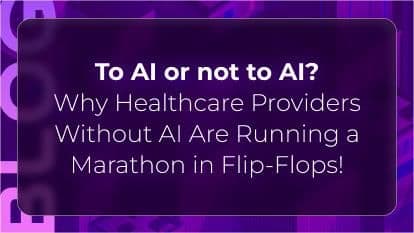


Let's be honest: if your healthcare practice isn't leveraging AI yet, you're essentially trying to run a high-stakes relay race wearing flip-flops while your competitors zoom past in high-tech running shoes. AI in healthcare isn't some futuristic fantasy—it's already here, making providers who use it faster, smarter, and more profitable than those who don't.
From real-time eligibility verification to automated patient outreach and intelligent claims processing, AI-driven providers are optimizing revenue cycles, reducing denials, and delivering better patient experiences. Those who don't? Well, they're still manually dialing insurance companies and navigating the labyrinth of paperwork like it's 1999.
According to McKinsey, AI-driven automation can cut administrative costs by up to 30% while reducing claim denials by 50%. Another report suggests that AI could save the U.S. healthcare industry a staggering $150 billion annually by 2026.
And let's talk about speed: AI-powered systems process claims and verify eligibility in seconds, while traditional manual methods can take days. In an industry where time is money—and patient care is at stake—these numbers aren't just impressive; they're a wake-up call.
Revenue Cycle Management on Steroids:
AI optimizes every step of the revenue cycle, from claims submission to payment posting. With machine learning, providers can predict denials before they happen, ensuring cleaner claims and faster reimbursements. An AI-driven system can analyze thousands of claims in real time, detecting anomalies and preventing costly errors.
Call Automation: No More Elevator Music on Hold
Tasks like patient outreach, insurance verification, and appointment scheduling—once time-consuming for staff—are now effortlessly managed by AI-powered voice automation.
Imagine a platform that can make 200 calls with a single click and deliver real-time transcripts. Solutions like CallBotics go beyond just making calls—they intelligently navigate IVRs, wait on hold, engage in human-like conversations, and retrieve the required information, all while enhancing both the patient experience and the efficiency of the revenue cycle.
Real-Time Eligibility Checks (No More Guesswork)
Instead of staff spending 10-15 minutes per call verifying insurance eligibility, AI-driven platforms can check real-time eligibility with 4,000+ payers instantly. This means fewer claim rejections, happier patients, and a more efficient practice.
Predictive Analytics: Seeing the Future Before It Happens
AI doesn't just automate—it anticipates. With predictive analytics, providers can forecast patient no-shows, identify at-risk patients, and even detect fraudulent claims before they hit the system. It's like having a financial crystal ball but backed by hard data instead of vague predictions.
A mid-sized healthcare provider in Texas struggled with high claim denial rates (around 20% of claims were being rejected), long patient call wait times, and revenue leakage due to slow eligibility verification. After integrating AI-driven automation for claims processing, call handling, and real-time eligibility checks, they saw a 35% increase in collections, a 30% reduction in claim denials, and a 90% elimination of manual calling. The CFO later admitted, 'We didn't realize how much money we were leaving on the table until we let AI take the wheel.'
Let's be fair—some healthcare leaders are hesitant to embrace AI because of myths about job displacement, implementation headaches, or compliance concerns. But here's the truth: AI doesn't replace jobs; it enhances them. It frees up staff to focus on high-value tasks while ensuring compliance with HIPAA and SOC2 security standards.
And if implementation is a concern? Modern AI solutions are plug-and-play, with API integrations that make adoption seamless. The question isn't whether you should implement AI—the question is whether you can afford not to.
The healthcare industry isn't waiting for late adopters to catch up. Providers who embrace AI are already reaping the rewards, from faster claim approvals to better patient engagement and stronger revenue streams.Those who resist? Well, they might just be the next Blockbuster in a Netflix world.
So do you still want to run in those Flip-Flops??
CallBotics is the world’s first human-like AI voice platform for enterprises. Our AI voice agents automate calls at scale, enabling fast, natural, and reliable conversations that reduce costs, increase efficiency, and deploy in 48 hours.
For Further Queries Contact Us At: